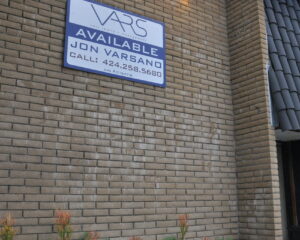Small Business Owner-Users and SBA Commercial Property Loans
West LA and Culver City Small Business Owners that have been successfully running their business for several years and have some savings should strongly consider becoming an Owner/User of their commercial real estate while taking advantages of the SBA-backed loan programs. Even if the SBA program is not for you, then now is a great opportunity to invest in your own business and controlling the commercial property that houses your livelihood.
The following chart shows the fluctuation of long term mortgage interest rates over the past 45 years. Whether you are looking for a commercial or residential loan, rates are at historic lows and have remained very low for the past 5 years. This opportunity will not last forever, though. Now is the time to take advantage of these low interest rates before it’s too late. A rise of few basis points sometimes makes the difference between a deal being affordable and a deal that doesn’t make sense.
In addition to low commercial loan interest rates, commercial real estate in Culver City and West LA is appreciating at a high rate, and rents are increasing at a high rate as well. Build equity (build additional wealth simply while running your normal business) by paying down your mortgage instead of just paying rent is a shrewd maneuver. Read more about rent vs. buy analysis for commercial real estate.
Long term investment in commercial real estate also compares favorably to other types of investments in today’s marketplace. CDs, Savings Accounts, T-Bills and other low-risk investments are paying a paltry rate of return. Take the money out of those low paying vehicles and put a down payment on commercial real estate. SBA loans require only 10% down. For example: Investing as little as $75,000 for a $750,000 commercial property.
While SBA-backed loans start at a minimum of 10% down, traditional commercial loans require at least 25% down. The downpayment requirement may be even higher depending on your lender and your qualifications. In general, commercial loans differ from residential loans in the following way.
- Some large lenders but mostly smaller, community banks.
- Mortgage is held in the bank’s own portfolio, and usually not sold on the open market to such secondary market buyers like Freddie Mac, etc.
- Flexibility with ownership such as titling properties in your LLC or corporation.
 SBA- backed loans are a form of commercial loan that the Small Business Administration helps secure. The government loan program for small businesses has been around since 1959. The SBA has two basic loan guarantee programs. If you’re looking for a small business loan to purchase commercial real estate or heavy machinery/equipment, the SBA 504 loan is the best choice. If purchasing a business or getting working capital is the goal, the SBA 7A loan is likely the better tool.
SBA- backed loans are a form of commercial loan that the Small Business Administration helps secure. The government loan program for small businesses has been around since 1959. The SBA has two basic loan guarantee programs. If you’re looking for a small business loan to purchase commercial real estate or heavy machinery/equipment, the SBA 504 loan is the best choice. If purchasing a business or getting working capital is the goal, the SBA 7A loan is likely the better tool.
More explicitly, with a SBA 504 loan, proceeds can be used to buy a building, finance ground-up construction or building improvements, or purchase heavy machinery and equipment. 7a loan proceeds can be used for short-term or long-term working capital and to purchase an existing business, refinance existing business debt, or purchase furniture, fixtures and supplies.
At-A-Glance Comparison
SBA-504 LOAN(Commercial Real Estate & Equipment) |
SBA 7(a) LOAN(General Purpose) |
|
|---|---|---|
| LOAN SIZE | Minimum – $125,000 Maximum – $20 million + |
Minimum – $50,000 Maximum – $5 million |
| INTEREST RATE | • Fixed | • Predominantly variable; some fixed-rate options |
| TERMS | • 20 years – real estate • 10 years – equipment |
• Up to 25 years – real estate • Up to 10 years – business acquisition, equipment • 5 to 7 years – working capital • Weighted average for mixed-use requests |
| DOWN PAYMENT | • 10% borrower | • Minimum 10% borrower(often more) |
Some general restrictions are:
- 51% owner occupancy for existing building
- 60% owner occupancy for new construction
- All assets financed must be used to the direct benefit of the business
- If the business has less than a 2 year operating history or is changing management, it will be considered a start-up business subject to a 15% down payment
- If the building is considered “Special Use” (i.e, a hotel, car wash, gas station, etc.) a 15% down payment is required.
- If the business is a start up and the building being financed is a special asset, the down payment required is 20%.
Most privately held companies are eligible. The business must be:
- Small (less than $15 Million in net worth and less than $5 Million in after tax income on average for the last two years)
- A for profit firm
Wells Fargo Bank is the largest lender of SBA loans and provides the following info about their SBA loans for the West LA and Culver City markets.
- Can be used or a variety of business purposes,includingthe acquisition of a business, partner buyouts, purchase or construction of a building, leasehold improvements, business expansion, franchise, equipment purchase, or working capital
- Loan sizes up to $5 million,with the ability to accommodate projects up to $11 million
- Low down payments—as little as 10% down for owner-occupied real estate purchases, allowing you to retain working capital while making big projects more feasible
- Longerterms—up to 25years fully amortized on real estate, making projects more affordable
- Ease of mind for the future—no balloon payments and only
a 3-year prepayment period on loans with terms of 15 years or more
For commercial loans over $750,000, current rates (as of February 26, 2015) are approximately (subject to change)
- 5 yr term amortized over 25yrs – 4.00%
- 7 yr term amortized over 25 yrs – 4.50%
- 10 yr term amortized over 25 yrs – 4.75%
As stated above, many commercial lenders and SBA lenders are smaller banks which offer a variety of rates and programs. Generally, the larger lenders have the strictest requirements but offer the most competitive rates. If you don’t meet those requirements, then seek out a smaller lender and if that fails private hard money lenders usually can help but at the highest rate of all. With interest rates at historic lows, sometimes even the highest rate makes sense for a purchase especially if a refinance in the near future is an option.
A traditional commercial loan is generally more concerned with the property and the income that it is producing, while an SBA requires a detailed review of your business and personal financial records. The SBA loan is not for everyone, but if you qualify the rates are very competitive and the low downpayment cannot be beaten. If you choose a traditional commercial loan, then the basic information from Chase Bank Commercial lending is as follows:
- Property Types: Industrial, Retail, Office and Mixed Use
- Loan Size: $1 million to $10 Million+
- Term / Amortization: 3-, 5-, 7- and 10-year term/Up to 30-year amortization (subject to property age, condition and underwriting)
- Interest Rate: 3.8% to 4.8% (as of February 26, 2015)
- Loan to Value: 75% maximum, subject to Bank’s underwriting criteria
- Debt Coverage Ratio: 1.25 minimum
- Application Deposit: The greater of $4,000 or 25 bps. Applied to loan fee; credited at closing
- Loan Fee: Minimum 1 point. Par pricing available
- Processing Fee: The greater of $2,000 or 12.5 bps, includes standard loan documents and credit reports. In most cases, no legal fees unless outside counsel is involved as a closing agent
- Liability: Non-Recourse available subject to approval
- Not Required: The following are not required in most cases: legal opinion, tax/insurance impounds, reserves for capital improvements, engineering report, and seismic/PML report
- Closing: Typically within 60 days from receipt of completed application
- Assumption: Yes, for a 1% fee (subject to approval)
- Prepayment Options: Step-down or yield maintenance
No matter what type of loan you choose, qualification is a process that takes time but is completely worth it in the long run. Most business owners are very business with the day to day operations to bother with being an owner-user, but they are missing out on a tremendous opportunity. Unless your business is making too much money for you to handle, then a wise investment in your own business’ real estate gives you freedom, control, and more options for the future. The SBA-backed loan program reduces the entry barrier to commercial property ownership lower than any other loan program available. Vars Realty works with a variety of lenders in the Culver City and Greater Los Angeles area. Contact us today to receive a complimentary rate quote and loan terms.
Notice: Trying to access array offset on value of type bool in /home/r6aecuxpio8s/public_html/wp-content/themes/findeo/template-parts/content-single.php on line 30



